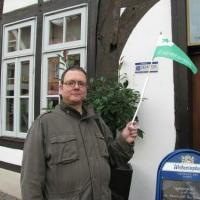Žinutės: 46
Kalba: English
espere (Rodyti profilį) 2013 m. balandis 4 d. 14:29:25
8 is ok; I've seen documents that say to pronounce it like "oc" in "occasion". Being from the SE US where we put heavy emphasis on all our vowels, especially the rounded ones, is it "oc" like "oak" (OH-kas-zhun... the long o) or "oc" like "octagon"? I've been going with "oak".
9 is naŭ. Does it sound like "now" or "gnaw"? I've been going with "gnaw".
So would 89 sound like "oc dek now", "oc dek gnaw", "oak dek now", or "oak dek gnaw"?
And how is "scii" pronounced? It looks like "sts-sss-EE-EE". I've been saying "ski".
Dankon!
EldanarLambetur (Rodyti profilį) 2013 m. balandis 4 d. 15:24:01
Once you learn the sounds of the individual letters, putting them together for any word should be easy.
So, go to this page:
http://en.lernu.net/lernado/gramatiko/konciza/elpa...
Which has audio samples of each letter.
So, for example, "scii" should be pronounced just as: s + c + i + i
Something like: st-see-ee
Hope that helps!
Matomo (Rodyti profilį) 2013 m. balandis 4 d. 15:28:05
Olsho (Rodyti profilį) 2013 m. balandis 4 d. 16:22:59
Matomo:As to your other question, the proper choice is "oak dek now."Saluton Matomo,
Are you sure about this? I mean, I don't dare putting the statement of a native speaker into question, but for me, "oak" has a "long o" whereas the Esperanto "ok" is a short one, so, for me, more similar to "ock" (which probably does not exist in English) or "oc" as in "octagon" or "octopussy". - On the other hand, if I mispronounce those words...., so, please do not be too angry.
Concerning "naŭ", I would also go for "now".
Anyway, I think Espere will best follow Eldanar's hint to listen to the proper pronounciation on lernu.net.
Have a nice time.
Cheers
LordMarv (Rodyti profilį) 2013 m. balandis 4 d. 20:21:31
I too am in the same boat, I'm a brand new beginner who is self teaching. I've listened to alot of videos on youtube with Esperanto speakers. Doesn't make me any kind of expert or anything, but I have noticed some Esperanto speakers are a pure pleasure to listen to. And those are not necessarily the most fluent or the fastest speakers either, but those who try to speak their words clearly. And folks from different regions and countries bring their own slightly different sound to the language. For me now, there is a free downloadable programme that I and alot of Esperantists have used called Kurso De Esperanto 4. Sits on your computer and you can use it anytime, good lessons, and excellent spoken audio of all the words you're learning. And I find that I really like the pronounciation/accent of these speakers and I am trying to model my own Esperanto speech after them. I believe this was recorded by Brazilian Esperanto speakers, but I may be wrong. You can use this program on any windows computer, it even works fine on windows 8, and I see it also runs on linux and mac. It's free, no adware or anything. Here is the link http://www.kurso.com.br/index.php?en
I, myself have been wanting to contact other brand new Esperanto learners, to help me with the same kind of questions you are asking...but I wasn't sure how to go about it. I'm not to the point yet where I can write or converse on the instant messenger yet, or correspond by email in Esperanto. Still learning basics and simple grammar. I'm trying to learn a little every day and not oversaturate myself....and I'm an old guy too...lol...50 yrs, and the rememberer doesn't remember as well as it used to.
So thank you for putting the question on the forum...I appreciate it!!
espere (Rodyti profilį) 2013 m. balandis 5 d. 00:50:57
Olsho:Thanks for the clarifications! But now that has opened up a new can of worms. Like I said, southerners add stress to their vowels. Apparently I've been getting "aŭ" wrong. I thought it was "aw" as in "awesome" and not "ow" as in "ouch". I would absolutely love to meet someone from the SE who speaks Esperanto well.Matomo:As to your other question, the proper choice is "oak dek now."Saluton Matomo,
Are you sure about this? I mean, I don't dare putting the statement of a native speaker into question, but for me, "oak" has a "long o" whereas the Esperanto "ok" is a short one, so, for me, more similar to "ock" (which probably does not exist in English) or "oc" as in "octagon" or "octopussy". - On the other hand, if I mispronounce those words...., so, please do not be too angry.
Concerning "naŭ", I would also go for "now".
Anyway, I think Espere will best follow Eldanar's hint to listen to the proper pronounciation on lernu.net.
Have a nice time.
Cheers
espere (Rodyti profilį) 2013 m. balandis 5 d. 00:59:11
LordMarv:Espere:The first thing I had to do was get used to seeing it, especially that "j" thing. I try to read and speak it, and like I said, when I do pushups or situps, I count in Esperanto. Kvindek situps and tridek pushups. Anytime I can try to translate something, like the colors of the traffic light or the day of the week -- "ĵaŭdo" has a nice ring to it -- or anything like that helps make it stick a little better. It worked for me in French although French pronunciation requires much more accuracy!
I, myself have been wanting to contact other brand new Esperanto learners, to help me with the same kind of questions you are asking...but I wasn't sure how to go about it. I'm not to the point yet where I can write or converse on the instant messenger yet, or correspond by email in Esperanto. Still learning basics and simple grammar. I'm trying to learn a little every day and not oversaturate myself....and I'm an old guy too...lol...50 yrs, and the rememberer doesn't remember as well as it used to.
So thank you for putting the question on the forum...I appreciate it!!

kefga_x (Rodyti profilį) 2013 m. balandis 5 d. 08:01:38
espere:Thanks for the clarifications! But now that has opened up a new can of worms. Like I said, southerners add stress to their vowels. Apparently I've been getting "aŭ" wrong. I thought it was "aw" as in "awesome" and not "ow" as in "ouch". I would absolutely love to meet someone from the SE who speaks Esperanto well.I'm from South Florida, but have lived in Virginia too. I'll try to explain this in a way that is easy to understand.
The first problem is the "o" (and "a" for a lot of people) that is "correct" in Esperanto doesn't exist in English. The closest thing is exactly the "o" in "oak".
I'll go through and break down the various words already mentioned to try to clear things up for you.
First, for reference, English Phonology (vowels).
"aw" as in "awesome" "octagon" or "octopussy" "gnaw" = ɑ ~ "a" (esperanto)
"oak" = oʊ ~ "o" (esperanto)
"ow" as in "ouch" "now" = aʊ ~ aŭ (esperanto)
When you specify your variety of English, the feature you really mean is drawing out these diphthongs. If you're interested, I'll go into more detail on how the Esperanto vowels differ from those above, but that should be enough to help you approximate the right vowels.
The "c" in esperanto can't exist in English in the positions that it can in Esperanto, but it does exist! It's the "ts" as in "bats". The "correct" prononciation of "scii" written out in a more english-like way would be something like, ss-tsyiyi.
Kirilo81 (Rodyti profilį) 2013 m. balandis 5 d. 09:47:44
kefga_x:In fact, that is how 'o' should be in Esperanto ('a' is [a] in IPA), only short, while in awesome it is long.
"aw" as in "awesome" "octagon" or "octopussy" "gnaw" = ɔ ~ "a" (esperanto)
You can hear the numbers spoken here, starting at 1:15 (I would pronounce the 'o' in ok and the 'a' in naŭ even a bit shorter than in the video).
Matthieu (Rodyti profilį) 2013 m. balandis 5 d. 09:50:04



